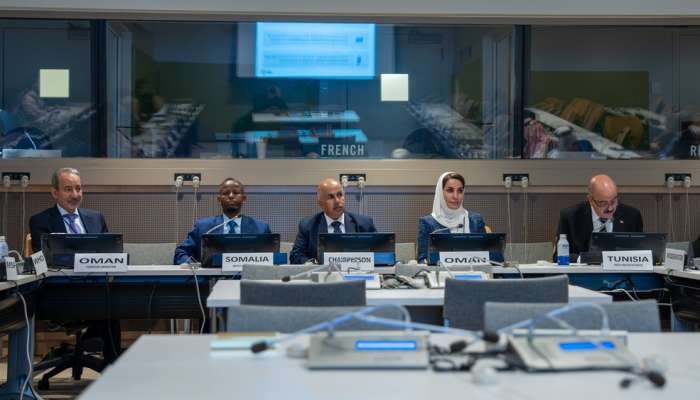
New York: The Sultanate of Oman on Wednesday organised a high-level international dialogue in partnership with Finland, Somalia, Sudan, Switzerland, and Yemen, titled "The Global Health and Peace Initiative (GHPI)," on the sidelines of the 80th session of the United Nations General Assembly at the UN headquarters in New York.
In his speech, Dr. Hilal Ali Al Sabti, Minister of Health, emphasised that Oman has consistently adopted dialogue, understanding, and cooperation as steadfast pillars of its foreign policy. He affirmed Oman's belief that health can serve as a bridge to peace, bringing communities together, fostering mutual trust, and contributing to resilience in the face of conflict and fragility.
He reiterated Oman's firm commitment to achieving the vision and objectives of the Health for Peace Initiative's roadmap and entrenching the "Health and Peace" approach across all programmes to ensure they are inclusive, equitable, participatory, and sustainable.
He added that this World Health Organization (WHO)-led initiative calls for designing health programs that not only save lives but also strengthen social cohesion and promote stability.
The minister noted that the region, like many parts of the world, continues to face the repercussions of acute and prolonged conflicts and recurrent emergencies, leading to internal and external displacement, weakened health systems, and deteriorating health conditions for millions.
He pointed out that achieving the health-related Sustainable Development Goals in such contexts would be nearly impossible unless responses are adapted to mitigate the exacerbation of challenges on the ground while enhancing the capacity to deliver necessary assistance.
He affirmed that Oman will continue its role as a bridge connecting nations, fostering dialogue, and transforming shared challenges into shared opportunities for a healthier and more peaceful world.
A number of international experts and representatives delivered presentations on various dimensions of the health-peace nexus and the roles of different stakeholders. Dr. Abdullah Hamoud Al Harthi, Advisor to the Minister of Health for International Cooperation, commenced the programem with a presentation on the links between health and peace and Oman's role in this field. This was followed by a presentation by Elizabeth Spehar, Assistant Secretary-General for Peacebuilding Support, outlining the efforts of the Department of Political and Peacebuilding Affairs (DPPA).
Dr. Mohammed Yaqub Genawi, WHO Regional Director for Africa, delivered a presentation focusing on the relationship between health and peace. Dr. Asmus Hammerich, Director of Noncommunicable Diseases at the WHO Eastern Mediterranean Regional Office, addressed the reality of noncommunicable diseases in emergency settings, highlighting the role of the Global Health and Peace Initiative.
Meanwhile, Dr. Inma Vazquez, Head of Humanitarian Diplomacy at Médecins Sans Frontières (Doctors Without Borders), presented on ways to protect healthcare and health workers during conflicts. The series of presentations concluded with Dr. Beth Stinchcombe, representing the International Federation of Medical Students' Associations (IFMSA), who delivered a visual presentation on the "Role of Youth in the Global Health and Peace Initiative."
The event resulted in the announcement of new commitments to integrate health and peace into national and international policies and raised a set of recommendations to the UN General Assembly to support the global health and peace agenda.
This event aimed to highlight the pivotal role of health in cementing peace and development, showcase best practices and international experiences, and strengthen multi-sectoral partnerships to build more resilient and stable health systems worldwide.
It is worth noting that the Global Health and Peace Initiative (GHPI) is a WHO initiative aimed at enhancing the links between health programs and peacebuilding efforts. It was launched by Oman and Switzerland in November 2019, following multi-stakeholder consultations in Geneva involving over 50 representatives from 24 countries and international partners.
In May 2024, WHO Member States adopted a resolution on the initiative after several years of consultations with a wide range of stakeholders to develop a roadmap. Since its adoption, the WHO has been actively implementing the initiative through various work streams and promoting its corresponding roadmap.